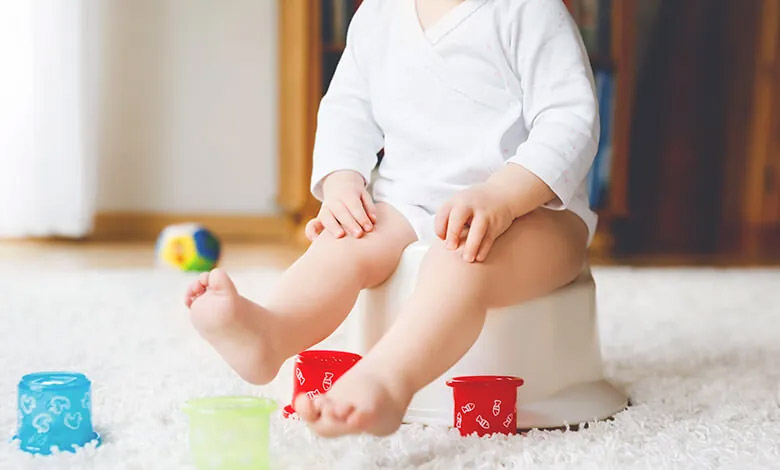Constipation is a common childhood condition, affecting around 1 in 7 babies in the first year of life. While it can be distressing to see your child passing hard poos with pain and discomfort, the good news is that constipation doesn’t usually have a serious cause.
There are plenty of things you can do to help if your child gets constipated – it all starts with knowing what’s normal, and what signs to look out for.
1. Know the basics about your child’s poo
When it comes to your child’s poo, it’s important to remember there is a wide range of normal. The amount of poo, colour and consistency depends on your individual child, their age, and whether they are breastfed, formula-fed, or on solids.
Contrary to some beliefs, infrequent poos does not automatically mean your child is constipated. It is quite normal for children to go for several days without a poo, so long as it is eventually easy to pass and well-formed – not too hard, not too soft, smooth and passed without strain.
2. Be aware of the signs of constipation
Constipation is when your child has hard poo, large poo or trouble pushing poo out. Children with constipation often don’t do poos regularly. Some telltale signs of constipation include:
- Stomach pain that comes and goes
- Your child may feel less hungry than usual
- Hard lumpy poos
- Hard lumps of poo may be felt if you press gently on your child’s stomach
- Your child may be generally cranky or irritable
- ‘Holding on’ behaviour like rocking or fidgeting, to avoid doing a painful poo
3. Keep a feeding and digestion diary
If you think your child may be suffering from constipation, it’s a good idea to keep a feeding and digestion diary to help you gain a good picture of your child’s health over time. It will also assist your healthcare professional in identifying and monitoring any unusual signs.
Your feeding and digestion diary can include information like what and how much your child eats, how long it takes, and any difficulties during or after. You can also record when they do a wee or poo, the colour and consistency, and any difficulties before or during.
4. Take another look at your child’s diet
A healthy diet is very important, especially one that is high in fibre. Some easy ways to help manage constipation through your child’s diet include eating more wholegrain or wholemeal breads, rice and cereals; offering more fruits, dried nuts and vegetables; and encouraging your child to drink lots of water.
If your baby is under 4–6 months of age and not yet on solids, you can help manage constipation by offering extra drinks of water, giving a gentle tummy massage, or giving them a warm bath. If your baby is formula-fed, check their formula tin to make sure you are making it correctly
5. Speak to a healthcare professional
Having a child with constipation can be stressful, especially if they are experiencing pain and discomfort. While the cause of constipation can often be dietary, sometimes it may be due to other causes. That’s why it’s a good idea to speak to your healthcare professional if your child is experiencing constipation regularly, especially for babies under 12 months old.
In addition to investigating the cause of your child’s constipation, your healthcare professional may have other suggestions for treatment, including laxative medicines or a formula change for formula-fed babies.
Whatever the cause, you should try and solve the problem sooner rather than later – the longer your child remains constipated, the worse it may become and the longer it may take to treat.





